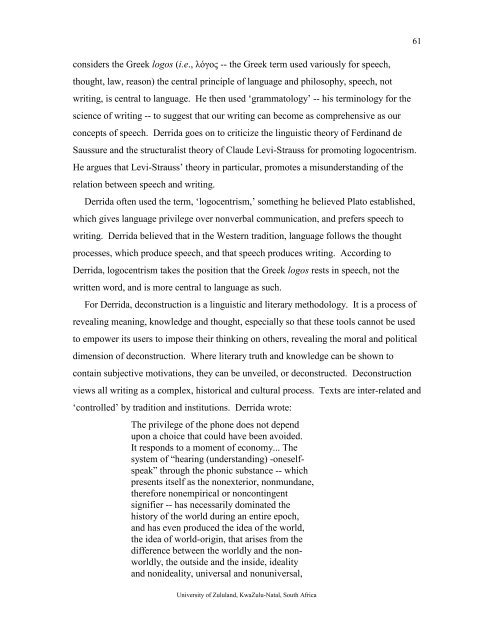Haase_UZ_x007E_DTh (2).pdf - South African Theological Seminary
Haase_UZ_x007E_DTh (2).pdf - South African Theological Seminary
Haase_UZ_x007E_DTh (2).pdf - South African Theological Seminary
Create successful ePaper yourself
Turn your PDF publications into a flip-book with our unique Google optimized e-Paper software.
considers the Greek logos (i.e., λόγος -- the Greek term used variously for speech,<br />
thought, law, reason) the central principle of language and philosophy, speech, not<br />
writing, is central to language. He then used ‘grammatology’ -- his terminology for the<br />
science of writing -- to suggest that our writing can become as comprehensive as our<br />
concepts of speech. Derrida goes on to criticize the linguistic theory of Ferdinand de<br />
Saussure and the structuralist theory of Claude Levi-Strauss for promoting logocentrism.<br />
He argues that Levi-Strauss’ theory in particular, promotes a misunderstanding of the<br />
relation between speech and writing.<br />
Derrida often used the term, ‘logocentrism,’ something he believed Plato established,<br />
which gives language privilege over nonverbal communication, and prefers speech to<br />
writing. Derrida believed that in the Western tradition, language follows the thought<br />
processes, which produce speech, and that speech produces writing. According to<br />
Derrida, logocentrism takes the position that the Greek logos rests in speech, not the<br />
written word, and is more central to language as such.<br />
For Derrida, deconstruction is a linguistic and literary methodology. It is a process of<br />
revealing meaning, knowledge and thought, especially so that these tools cannot be used<br />
to empower its users to impose their thinking on others, revealing the moral and political<br />
dimension of deconstruction. Where literary truth and knowledge can be shown to<br />
contain subjective motivations, they can be unveiled, or deconstructed. Deconstruction<br />
views all writing as a complex, historical and cultural process. Texts are inter-related and<br />
‘controlled’ by tradition and institutions. Derrida wrote:<br />
The privilege of the phone does not depend<br />
upon a choice that could have been avoided.<br />
It responds to a moment of economy... The<br />
system of “hearing (understanding) -oneselfspeak”<br />
through the phonic substance -- which<br />
presents itself as the nonexterior, nonmundane,<br />
therefore nonempirical or noncontingent<br />
signifier -- has necessarily dominated the<br />
history of the world during an entire epoch,<br />
and has even produced the idea of the world,<br />
the idea of world-origin, that arises from the<br />
difference between the worldly and the nonworldly,<br />
the outside and the inside, ideality<br />
and nonideality, universal and nonuniversal,<br />
61<br />
University of Zululand, KwaZulu-Natal, <strong>South</strong> Africa

















